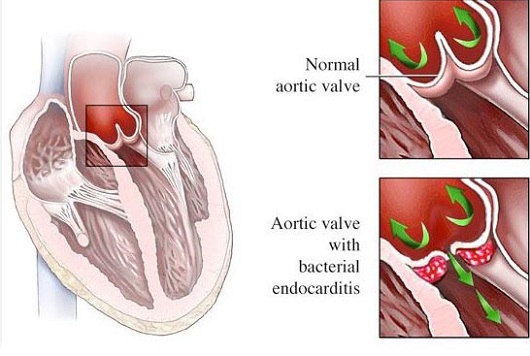Nikhil Prasad Fact checked by:Thailand Medical News Team Jul 26, 2024 1 year, 6 months, 1 week, 4 days, 22 hours, 55 minutes ago
Medical News: Native valve infective endocarditis (NVE) is an infection that targets the inner lining of the heart's valves. Once considered a disease primarily affecting young or middle-aged adults with underlying conditions such as rheumatic heart disease or congenital heart defects, it now predominantly impacts older adults. This
Medical News report explores the latest findings on NVE, highlighting its causes, symptoms, and treatments. Researchers from the Centre Cardiologique du Nord in France, along with various other institutions, have provided new valuable insights into this potentially deadly condition.
 New insights into infections involving the heart’s valves
Changing Demographics and Causes
New insights into infections involving the heart’s valves
Changing Demographics and Causes
NVE has evolved significantly over recent decades. While rheumatic heart disease and congenital heart defects were once the primary risk factors, today's patients are more likely to be older adults with prosthetic heart valves, implanted cardiac devices, or those undergoing hemodialysis. Immunosuppression and intravenous drug use have also emerged as significant risk factors. The demographic shift has been accompanied by a change in the bacteria responsible for NVE. Previously, staphylococci, particularly Staphylococcus aureus associated with healthcare contact and invasive procedures, were the leading cause. However, streptococci have now become the most common culprits.
Symptoms and Diagnosis
NVE presents a variety of symptoms, making early diagnosis challenging. Common signs include fever, heart murmurs, fatigue, night sweats, and unintentional weight loss. Acute presentations may involve congestive heart failure, stroke, severe sepsis, or septic shock, while subacute cases might manifest as low-grade fever, malaise, chills, dyspnea, back pain, and joint pain over several weeks or months.
Accurate diagnosis relies on blood cultures and echocardiograms. Blood cultures identify the causative bacteria, while echocardiography detects vegetations on the heart valves. Transesophageal echocardiography (TEE) is more sensitive than transthoracic echocardiography (TTE) for identifying valvular vegetations and complications. In cases where blood cultures are negative, advanced molecular techniques like polymerase chain reaction (PCR) can help identify the responsible pathogens.
Microbiological Landscape
Gram-positive bacteria are the primary culprits behind NVE, with staphylococci and streptococci being the most common. Specifically, Staphylococcus aureus accounts for 35-40% of cases, while Viridans streptococci and Streptococcus gallolyticus represent about 20% and 15%, respectively. Enterococci are responsible for approximately 10% of cases. Other, less common pathogens include coagulase-negative staphylococci, HACEK organisms (Haemophilus, Aggregatibacter, Cardiobacterium, Eikenella, Kingella), and fungi like Candida and Aspergillus. These bacteria form biofilms on the heart valves, making them resistant to antibiotics and the body's immune response.
Antibiotic Treatments
t;
Effective treatment of NVE hinges on the prompt administration of appropriate antibiotics. For methicillin-susceptible Staphylococcus aureus (MSSA), beta-lactam antibiotics such as oxacillin or cefazolin are preferred over vancomycin or daptomycin. In older patients or those with renal impairment, ampicillin combined with ceftriaxone is recommended over aminoglycoside-containing regimens for Enterococcus faecalis infections. The choice of antibiotics is guided by the susceptibility profile of the isolated bacteria, and treatment duration typically spans several weeks to ensure complete eradication of the infection.
When Surgery is Needed
Surgical intervention is often necessary for patients with severe NVE. Surgery is indicated for uncontrolled infection, heart failure due to valvular damage, or to prevent embolism. Early surgery can significantly improve outcomes, but the timing of the procedure is crucial and must be determined by a multidisciplinary team. In cases of uncontrolled infection, persistent fever despite antibiotic treatment may necessitate immediate surgery to remove infected tissues and repair or replace damaged valves.
Heart failure caused by severe valvular regurgitation or obstruction, particularly when associated with pulmonary edema or cardiogenic shock, also requires prompt surgical intervention. Additionally, preventing embolic events, especially in patients with large vegetations or those who have already experienced embolic complications, is another critical indication for surgery.
Advanced Imaging and Diagnosis
Advanced imaging techniques like positron emission tomography-computed tomography (PET-CT) and magnetic resonance imaging (MRI) play an essential role in diagnosing and managing NVE. These methods can detect complications such as abscesses, pseudoaneurysms, and fistulas, which might not be visible on standard echocardiograms. Recent updates to the Duke criteria for diagnosing infective endocarditis have incorporated these advanced imaging techniques, enhancing the accuracy of diagnosis.
Challenges and Future Directions
Despite advancements in diagnostics and treatments, challenges remain in managing NVE. The lack of randomized trials and logistical constraints hinder the development of standardized treatment protocols. The evolving microbiology of NVE and the rise of antibiotic-resistant strains also pose significant challenges. Ongoing research aims to address these issues by exploring new diagnostic methods, developing more effective treatment strategies, and understanding the disease's pathophysiology better.
Conclusion
Native infective endocarditis is a complex and potentially fatal disease that requires early diagnosis and prompt treatment. Researchers continue to explore new diagnostic methods and treatment strategies to improve patient outcomes.
The study review findings were published in the peer-reviewed journal: Microorganisms.
https://www.mdpi.com/2076-2607/12/7/1481
For the latest on Native Infective Endocarditis news, keep on logging to Thailand
Medical News.
Read Also:
https://www.thailandmedical.news/news/breaking!-covid-19-drugs-columbia-researchers-find-that-serotonin-and-ssri-drugs-like-fluvoxamine-can-cause-heart-valve-disease
https://www.thailandmedical.news/news/latest-study-links-celebrex-to-heart-valve-calcification-after-earlier-research-declared-drug-safe
